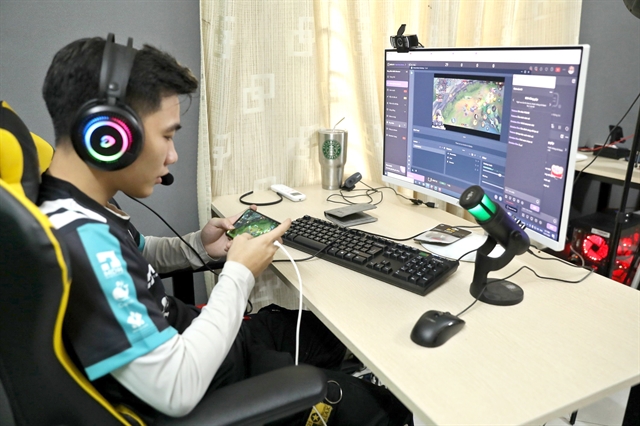Việt Nam’s gaming industry has taken a significant stride in 2024, with many important activities conducted by the Ministry of Information and Communications (MIC) in collaboration with game producers and distributors to guide the growth of the sector.

HÀ NỘI — Việt Nam’s gaming industry has taken a significant stride in 2024, with many important activities conducted by the Ministry of Information and Communications (MIC) in collaboration with game producers and distributors to guide the growth of the sector.
As of mid-November, the ministry had issued 288 G1 licences for electronic games, of which 184 remain active, while 104 were revoked. In a key indicator of industry growth, the number of new games granted G1 licences surged 25 per cent compared to 2023, with 169 games receiving approval.
This brings the total number of G1-licensed games in Việt Nam to 1,687, of which 1,125 are currently being distributed, with 562 games now inactive. Furthermore, there was a sharp increase in G2, G3 and G4 certifications, which rose 70 per cent, reflecting a growing diversification of the local gaming market.
G1, G2, G3, and G4 are certification stages in the game industry, representing incremental steps in the testing and approval process for games, starting from the initial build (G1) to the final, ready-for-release version (G4).
Despite the challenges of a highly competitive global gaming environment, the industry’s revenue is projected to reach approximately VNĐ12.5 trillion (US$492.65 million) in 2024. This is a slight decline from the previous year’s VNĐ12,552 billion.
Employment in the sector has grown substantially, with an estimated 4,100 workers, up 31 per cent from 2023. This growth is a direct result of the cooperation and alliances forged among local developers, distributors and the Government to strengthen Việt Nam’s position in the global gaming landscape.
A key milestone this year was the Việt Nam Gameverse 2024 exhibition, held in HCM City. The event attracted over 40,000 visitors and featured more than 60 organisations, including major international tech companies such as Google, Meta (Facebook), TikTok, Roblox, Moonton and Netmarble. The exhibition not only showcased the latest gaming innovations but also highlighted Việt Nam’s potential as a hub for gaming development and e-sports.
In addition to large-scale events, the ministry has facilitated numerous workshops and forums to connect local and international industry players, creating valuable networking opportunities. Việt Nam has also hosted international e-sports tournaments, further establishing itself as a growing player in the competitive gaming scene.
These efforts are complemented by initiatives aimed at nurturing local talent, including the launch of the VTC Game Academy, a partnership between the ministry, Posts and Telecommunications Institute of Technology and global tech giants like Google and Microsoft. The Academy's introduction of a new game design and development programme in 2024 underscores the country’s commitment to training the next generation of gaming professionals.
While Việt Nam’s gaming industry continues to expand, the ministry has also implemented strict measures to tackle illegal activities, particularly online gambling, which has plagued the sector.
In 2024, the ministry successfully shut down 667 Facebook fan pages promoting gambling and rewards-based games and removed over 600 unlicensed games from international app stores. Major platforms like Apple and Google responded by pulling 90 and 294 unauthorised games, respectively, helping to curb the spread of illicit content.
Despite these efforts, the industry still faces several challenges. A significant portion of games in the local market are foreign-made, with Vietnamese developers accounting for just 14 per cent of the market share. This is in stark contrast to China, which dominates the industry with an 81 per cent market share.
Local developers also face frequent copyright disputes and often play a limited role as distributors rather than producers, despite Việt Nam’s growing capacity for game development.
Looking ahead to 2025, the MIC plans to continue fostering the growth of the sector while ensuring effective regulation. Key initiatives include the establishment of industry-specific training programmes that focus on game design, programming and graphic arts, as well as the organisation of the third Gameverse event, which is expected to attract leading global players to Việt Nam’s thriving gaming scene. — VNS





